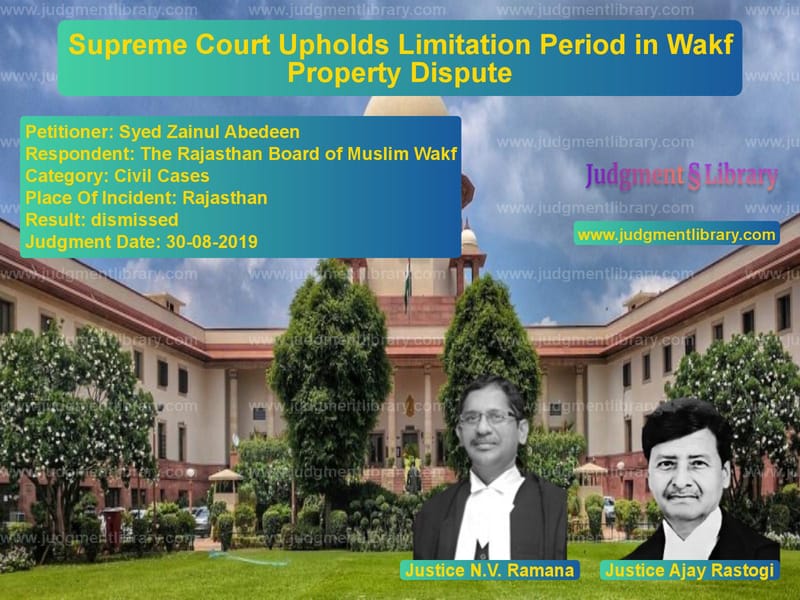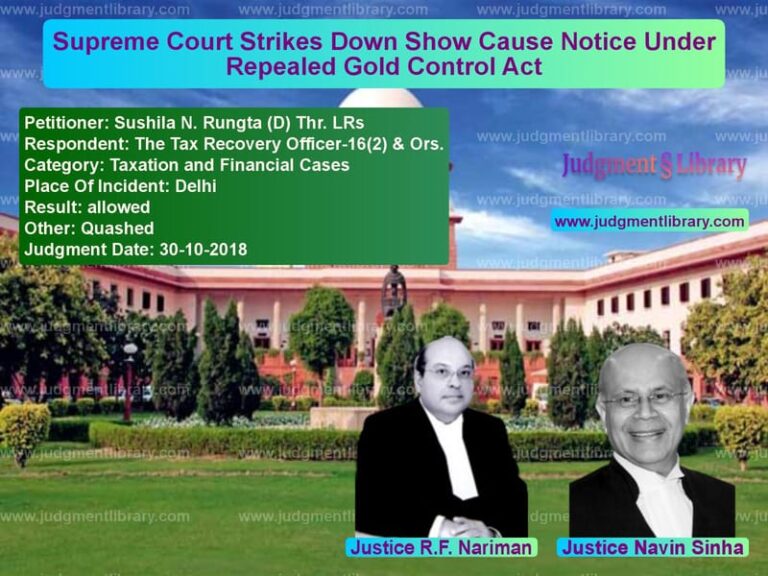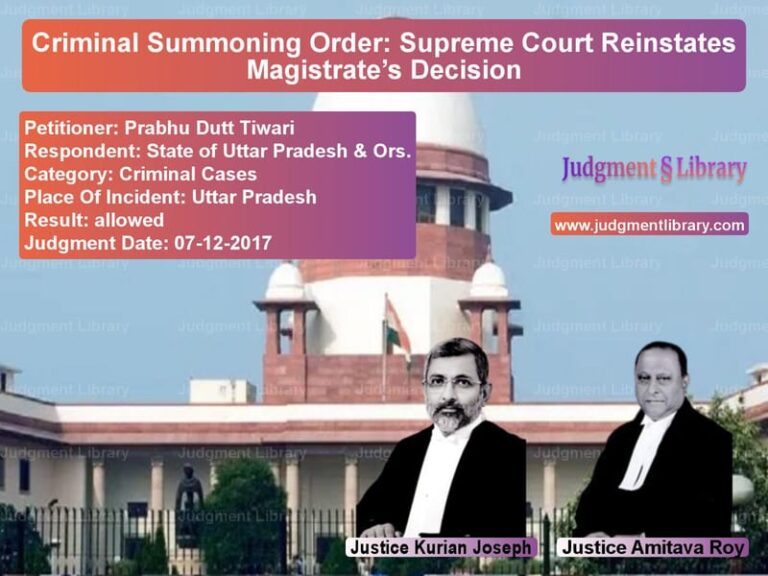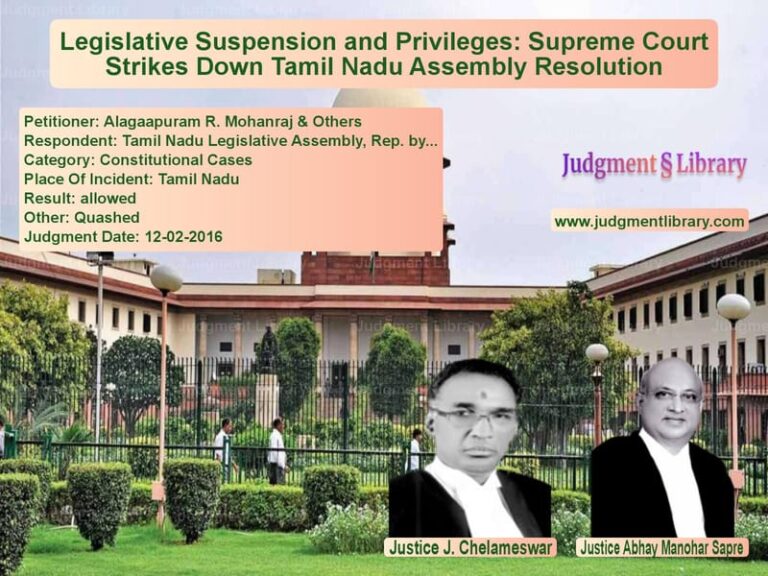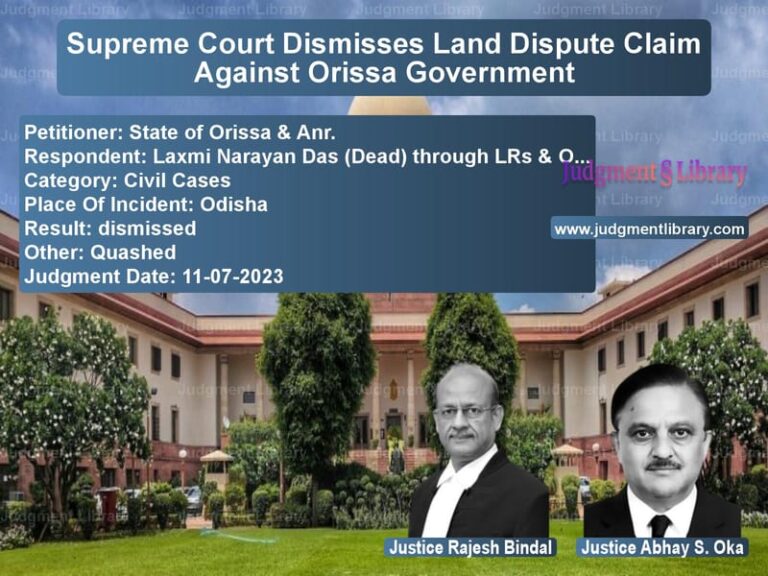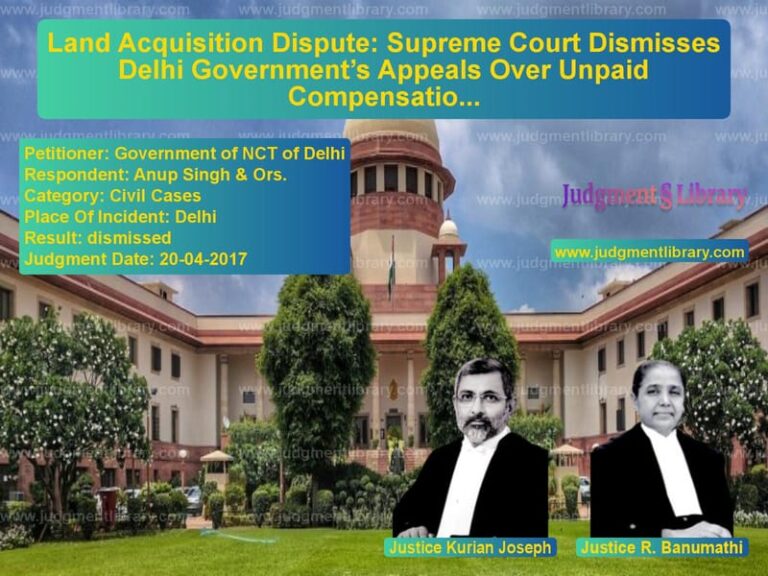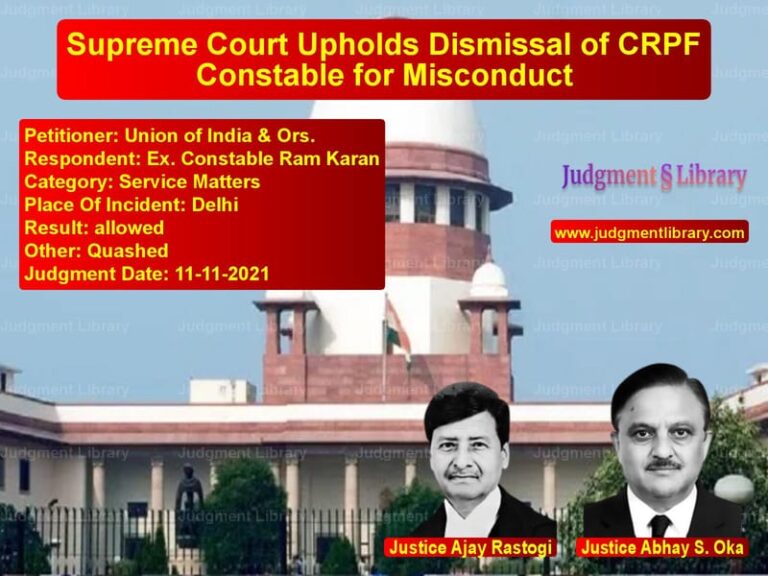Supreme Court Upholds Limitation Period in Wakf Property Dispute
The case of Syed Zainul Abedeen vs. The Rajasthan Board of Muslim Wakf revolved around the dispute over the classification of a Wakf property. The Supreme Court, in its judgment dated 30th August 2019, upheld the concurrent findings of the lower courts that the suit filed by the appellant under the Wakf Act, 1954 was barred by limitation. The ruling reaffirmed that the period for challenging the classification of a Wakf property is strictly limited to one year under Section 6 of the Act.
Background of the Case
The dispute arose when the appellant, Syed Zainul Abedeen, filed a suit under Section 6 of the Wakf Act, 1954, challenging the classification of the property known as Mandarja Madnumber 14. The appellant sought the following declarations:
- That the property was not Wakf Al-Allah but was Wakf Alal Aulad.
- That the property, excluding the mosque and mazar, be registered as Wakf Alal Aulad.
- That if the property was wrongly registered, it should be corrected.
The property in question had been declared as Wakf Al-Allah by a survey conducted under the Act in 1965. The list of Wakf properties, including the disputed property, was published in the Official Gazette on 2nd December 1965. The appellant filed the suit on 17th January 1967, beyond the one-year statutory period provided under Section 6.
Key Issues in Dispute
- Whether the suit was barred by limitation under the Wakf Act, 1954.
- Whether the classification of the property as Wakf Al-Allah was legally valid.
- Whether the courts had erred in dismissing the suit on procedural grounds.
Arguments by the Petitioner (Syed Zainul Abedeen)
- The classification of the property as Wakf Al-Allah was incorrect, and the property should have been registered as Wakf Alal Aulad.
- The suit should be governed by the three-year limitation period under Article 113 of the Limitation Act, rather than the one-year limitation under the Wakf Act.
- The statutory requirement of serving a two-month notice under Section 56 of the Wakf Act meant that the suit was filed within the permissible time.
Arguments by the Respondents (Rajasthan Board of Muslim Wakf)
- The survey was conducted in 1965 and the property was classified as Wakf Al-Allah.
- The appellant failed to challenge the classification within the one-year limitation period provided under Section 6 of the Wakf Act.
- The suit was barred by limitation and could not be entertained by the court.
- The procedural requirement under Section 56 had no bearing on the limitation period for challenging a Wakf property’s classification.
Supreme Court’s Observations
1. Strict Limitation Under Section 6
The Court reiterated the mandatory nature of the one-year limitation period under Section 6 of the Wakf Act. It held:
“Once the property is included in the list of Wakfs published in the Official Gazette, any dispute regarding its classification must be raised within one year. The Parliament, in its wisdom, has attached finality to the published list.”
2. No Scope for Extension of Limitation
The appellant had argued that the period should be governed by the Limitation Act. However, the Supreme Court held that the specific provision of the Wakf Act would override the general provisions of the Limitation Act. The Court stated:
“The period of limitation prescribed under Section 6 of the Wakf Act is specific and must be strictly followed. The general limitation period under the Limitation Act is not applicable in this case.”
3. No Merit in Section 56 Argument
The appellant also argued that the suit should be treated as timely because of the requirement under Section 56 to serve a two-month notice before filing a case against the Wakf Board. The Court rejected this argument:
“Section 56 applies to suits against the Board for its actions or inactions. It does not extend the limitation period for challenging the classification of Wakf property.”
Final Verdict
- The Supreme Court dismissed the appeal.
- It upheld the findings of all lower courts that the suit was barred by limitation.
- The property remained classified as Wakf Al-Allah.
Implications of the Judgment
- Reinforces that the limitation period for challenging Wakf property classification is strictly one year.
- Clarifies that the provisions of the Wakf Act override general limitation laws.
- Prevents belated legal challenges that could disrupt Wakf property administration.
- Ensures that once the survey process is completed, the classification remains final unless challenged within the prescribed period.
Conclusion
The Supreme Court’s ruling in this case strengthens the framework for managing and administering Wakf properties in India. By upholding the strict limitation period under the Wakf Act, the judgment ensures that disputes are resolved within a definite timeframe, preventing uncertainty in property classification. The decision also reinforces the importance of following procedural requirements while challenging governmental actions concerning religious and charitable endowments.
Petitioner Name: Syed Zainul Abedeen.Respondent Name: The Rajasthan Board of Muslim Wakf.Judgment By: Justice N.V. Ramana, Justice Ajay Rastogi.Place Of Incident: Rajasthan.Judgment Date: 30-08-2019.
Don’t miss out on the full details! Download the complete judgment in PDF format below and gain valuable insights instantly!
Download Judgment: Syed Zainul Abedeen vs The Rajasthan Board Supreme Court of India Judgment Dated 30-08-2019.pdf
Direct Downlaod Judgment: Direct downlaod this Judgment
See all petitions in Property Disputes
See all petitions in Judgment by N.V. Ramana
See all petitions in Judgment by Ajay Rastogi
See all petitions in dismissed
See all petitions in supreme court of India judgments August 2019
See all petitions in 2019 judgments
See all posts in Civil Cases Category
See all allowed petitions in Civil Cases Category
See all Dismissed petitions in Civil Cases Category
See all partially allowed petitions in Civil Cases Category

